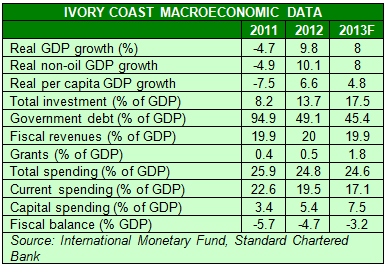Abraaj Capital is close to making major investments in the Ivory Coast (or Côte d'Ivoire), as the nation emerges from a decade-long civil conflict and participate in the wider growth taking root in the continent.
"We have approval for a deal that's just going through completion," Jacob Kohli, a partner at the private equity firm told Reuters. "We expect that at the end of this month earliest, or at the end of June at the latest."
The company is looking to capitalize on a country that offers tremendous potential and remains the world's largest cocoa grower despite a long-standing internal conflict in the nation of 20 million.
Indeed, the country's attraction extends beyond cocoa with some major international blue chips recognizing its potential.
"I believe Côte d'Ivoire can be in the vanguard of change," IMF director general Christine Lagarde said in a stirring speech earlier this year.
"After all, you have done it before. The Ivorian economic miracle was once the toast of Africa, the boast of the developing world. The time has come for a second Ivorian miracle. You have passed through the squalls of civil war--moving from conflict and fragmentation to unity and reconciliation. And now, under the leadership of president [Alassane] Ouattara, you are striving to become an emerging market economy within the next decade."
Political reform to quell investor fears
Allasane Ouattara had beaten the former president Laurent Gbago in run-off elections in late 2010, but the incumbent's refusal to accept the results led to months of violence and the deaths of 3,000 people - which added to the instability.
"Full reconciliation is still required before the country can return to a normal political environment," noted Standard Chartered in a recent report on the country. "The difficulty for president Ouattara is that former rebels helped him to gain power and he remains reliant on them to preserve security in the country."
Outtarra is consolidating his position and through a parliamentary decree, recently took greater control of his nation's economic program.
After contracting nearly 5% in 2011, the country's gross domestic product rose 9.8% last year and is expected to grow 7% annually over the next three years, in line with a National Development Plan.
"The government's reform program is set to continue," the IMF said. "Key priorities in this regard are value-added tax reform; further improvement in business climate; the adoption of a new electricity code; preparation of a medium-term strategy to manage the wage bill; and the preparation of a competition law."
Ivory Coast is reviewing its mining regulations to attract greater foreign investment, while shipping giant Maersk and its partner Bolloré and Bouygues are building a second container terminal in Abidjan at a cost of USD 591 million.
The consortium has committed to building a 35-hectare, financed by the port authorities. The partners hope to attract a greater number of shipping companies to Abidjan's new terminal, scheduled to start activities in 2016, with docking services for large-capacity ships capable of transporting at least 8,000 containers per vessel.
Endeavour Mining Corporation, a Toronto-listed company, said it's on schedule to complete the construction of USD 200 million Agbaou Gold Mine by the first quarter of 2014. The open pit mine has 103,000 ounces per year in reserves.
Hidden hydrocarbon riches
The country's oil fortunes may also change as France's Total SA said it has discovered oil offshore around 7,400 feet off Ivory Coast. The country is a small producer of oil with around 40,000 barrels per day of output, which generates 14% of the government's revenues. It has estimated reserves of 100 million barrels.
"The country has huge potential (e.g., in agriculture and mining) and there is room for positive surprises and higher growth rates, e.g., if significant amounts of commercially viable oil are found," said Standard Chartered Bank.
Abidjan, the economic capital of the country, is witnessing robust activity with the construction of roads and establishment of improved health and sanitation services systems apart from as property development by the private sector.
Standard Chartered Bank says despite a decade of conflict, the country's infrastructure remains largely intact, and Ivory Coast still among the ten largest economies in the continent, with a GDP of USD 24 billion.
Strong international aid is helping the government to step up public investment, which supports the economic rebound and narrows country's debt defaults.
The national debt situation has improved through debt restructurings and the bond issuance. The IMF notes that external public debt outstanding has declined, particularly after reaching the enhanced Heavily Indebted Poor Countries completion point at end-June 2012, from 56.8% of GDP (USD 13.3 billion) at end-2008 to 34.3% of GDP (USD 8.4 billion) at end-2012.
The bond swap has helped reduce the outstanding commercial external debt, from 13.2% of GDP (USD 3.1 billion) at end-2008 to 10.7% of GDP (USD 2.6 billion) at end-2012.
Optimism reigns
IMF's Lagarde notes the country is emerging out of the shadows for the following key reasons:
- Boosting public investment from 3% of GDP during the long political crisis to more than 7% of GDP in the 2013 budget, and actively enticing foreign investment.
- Attacking rural poverty by reforming the cocoa sector in a way that puts an extra XOF 80 billion in farmers' pockets, while maintaining Ivory Coast's pre-eminent position in cocoa production.
- Reforming the energy sector by supplying the power needed for domestic growth and exporting to neighboring countries, while starting the arduous process of bringing financial discipline to the electricity sector.
- Strengthening the business environment through the creation of commercial courts and a one-stop window for investment.
- Completing the cancellation or restructuring of its external debt.
"Cote d'Ivoire is clearly on the right path but, as usual, much will depend on politics," said Standard Chartered Bank. "Overall political stability should prevail, but many challenges remain in terms of security, army reform and reconciliation in order for the country to return to a fully normalized political situation."
© alifarabia.com 2013




















